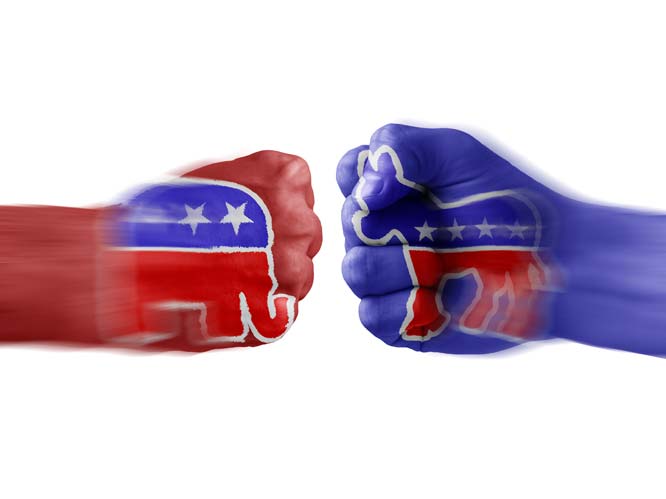
Who will control the United States Senate starting in January 2021? Once considered the greatest deliberative body in the world — at least in senators' own minds — the chamber's operations have degenerated into partisan packs of maneuvering pols following arcane rules until one side decides to change them for its own benefit.
It's become less about deliberations than affirmations of political loyalties and identities.
Every two years, one-third of the 100 Senate seats are up for grabs. Last time, Democrats faced the challenge of defending 26 seats. They lost two, giving Republicans a tenuous majority of 52 against a Democratic caucus of 48.
In 2020, the GOP must defend 23 of the 34 seats in contention. Three seats are open because Republicans are retiring, but they should be safe in Kansas, Wyoming and Tennessee.
Predicting the outcome is impossible this far out. Although most of the seats are historically safe, many opposition candidates have yet to be chosen. But who controls the Senate is a very big deal, though the full significance will depend in large part on who wins the White House.
If Donald Trump wins re-election, he and a GOP Senate under the disciplined direction of a re-elected Majority Leader Mitch McConnell can continue their ongoing political realignment of crucial district and appeals courts through hundreds of appointments. And they can solidify a conservative Supreme Court majority if there's any vacancy.
If Trump wins re-election and Democrats capture a Senate majority and hold House control, that will end the judicial transformation and give the party of Jefferson full control of the legislative branch. It will also tighten the divided government gridlock and political cage fights that voters collectively seem to favor these days despite their complaints.
If Democrats win the White House, the House and the Senate, it's a political replay of the first two years of the Bill Clinton and Barack Obama presidencies and a brief freeway for liberal legislation such as Obamacare.
Those experiments in one-party control were quickly snuffed each time after 24 months, with Republicans restored to a majority in at least one congressional chamber.
In an intriguing historic way, the fortunes of Senate control this time depend in large part on who's in the presidential race. Conventional wisdom holds that Trump is in deep trouble given his majority disapproval every day since inauguration.
Of course, conventional wisdom also held that Hillary Clinton was a surefire victor in 2016. Twenty-two Democrats are seeking the party's presidential nomination, with one or two more likely to jump in. None of them could be a worse candidate than Clinton, who ran out of energy, vision, strategy, imagination and health.
And honestly, Trump's base has proven rock-solid in the low 40s. He lost the popular vote in 2016 with only 46% but had just enough support in just the right places — sometimes by the slimmest of margins in crucial states — to secure a comfortable majority in the Electoral College.
There's a long, long way to go this cycle. Can Trump repeat that success? Likely so, even with his antics if Democrats nominate someone even older on the far left such as Sen. Bernie Sanders.
As with the 17-candidate GOP field in 2016, many of these Democrats are not realistic challengers. They're really running for a possible Cabinet seat (think Ben Carson, Rick Perry) or to build teams, national name recognition and nationwide donor lists for future campaigns.
Democrats want a fresh face. Might they settle for the long experience of Obama's No. 2, Joe Biden, who's almost as old as Sanders? Will they go for a black freshman senator like Kamala Harris and make her the first female president? How important will ideological progressive purity be?
If the immense field remains immense, that seems likely to prolong the primary campaign, possibly creating a deadlocked first ballot at the convention, cutting the time for unification and boosting the chances for Trump with his loyal legions.
And what about Howard Schultz, another multi-billionaire who's considering an independent run? He can't win. But he can cripple the Republican incumbent; think Ross Perot in 1992.
While the mayor of South Bend, Indiana, Pete Buttigieg, seems likely too young at 37 to become commander-in-chief, he's not too young to run for an Indiana Senate seat in 2022.
The Senate in recent times has become a spawning ground for presidential ambitions, though surprisingly not for presidents. The list of unsuccessful one-time senator-wannabe-presidents is long and includes Ted Kennedy, John McCain, Walter Mondale, Gary Hart, Hubert Humphrey, Al Gore, John Edwards, Bill Bradley, John Kerry, and long before them, Daniel Webster.
In an age of celebrity and big money, watch for American politics to slowly shift away from emphasis on experience in political office toward fresh faces that excite voters. Obama, for instance, did not complete even half a Senate term. Trump never held any elective office before the White House.
One-third of the candidates in the current Democrat field are senators. But here's an historical reality check for them: In 243 years of nationhood, only three men from that once-august body have ever become presidents — Warren Harding, John Kennedy and Obama.
(COMMENT, BELOW.)
Andrew Malcolm
McClatchy Washington Bureau
(TNS)
Malcolm is an author and veteran national and foreign correspondent covering politics since the 1960s.


 Contact The Editor
Contact The Editor
 Articles By This Author
Articles By This Author